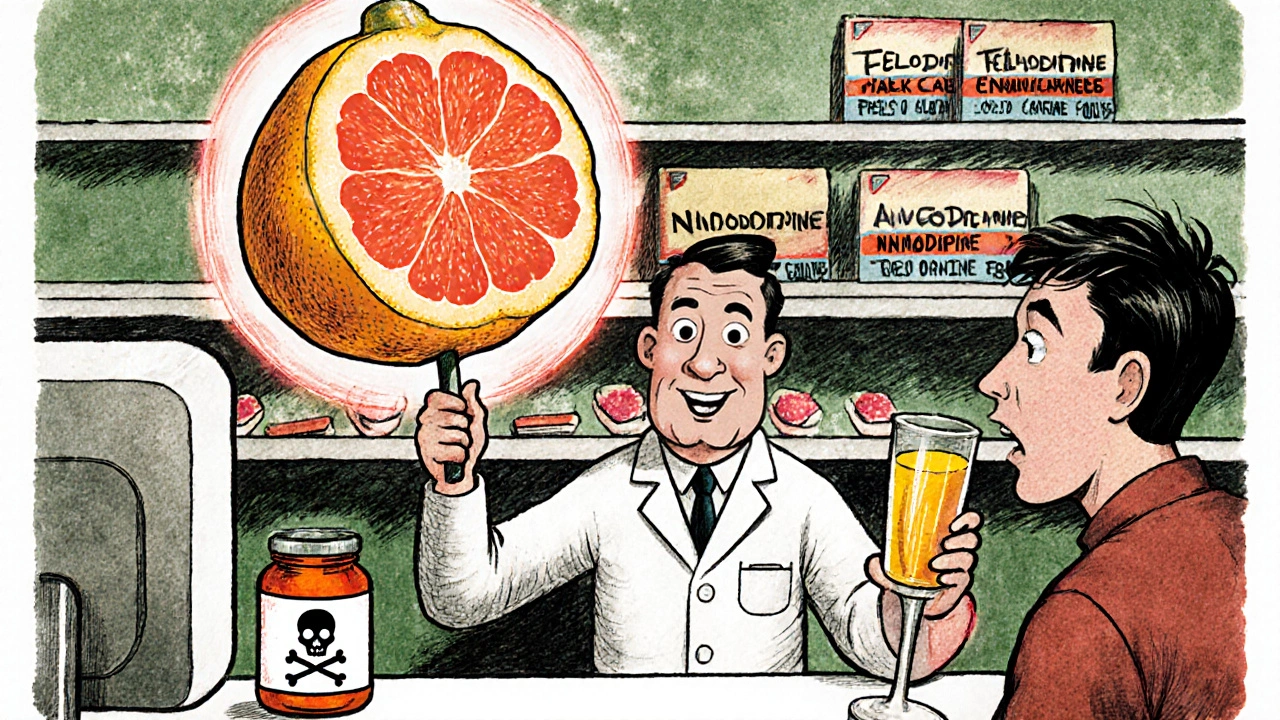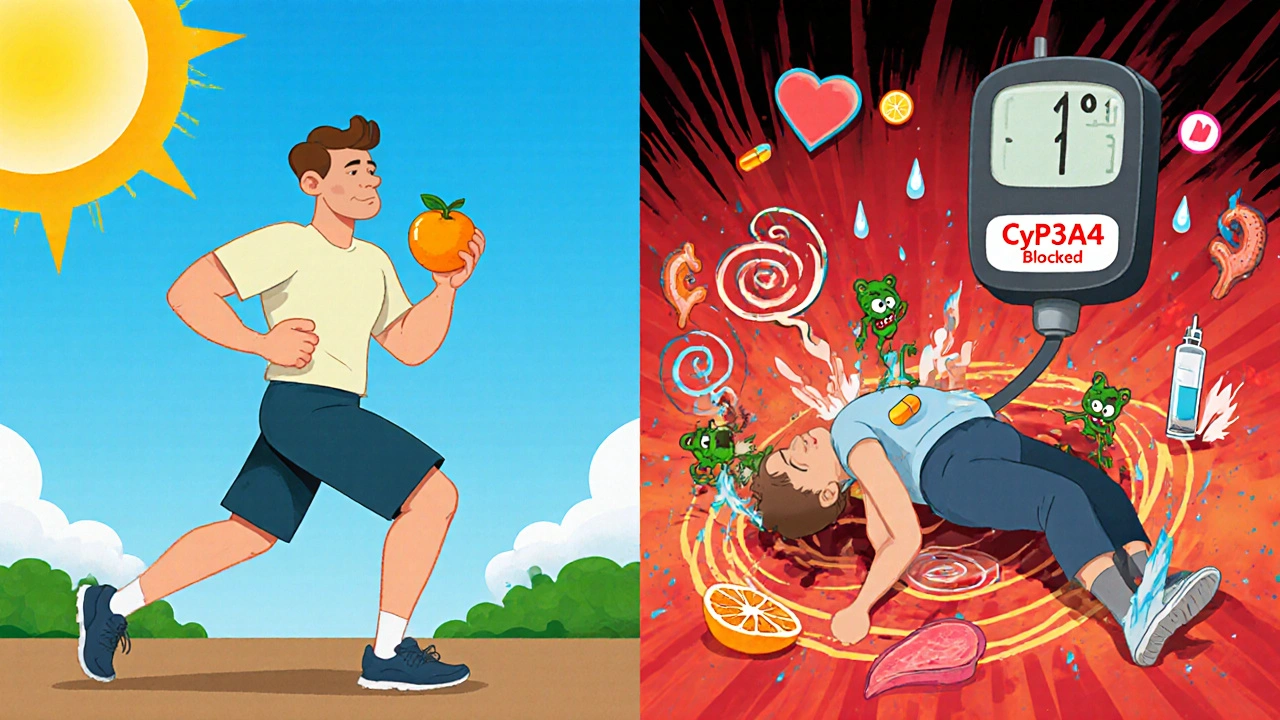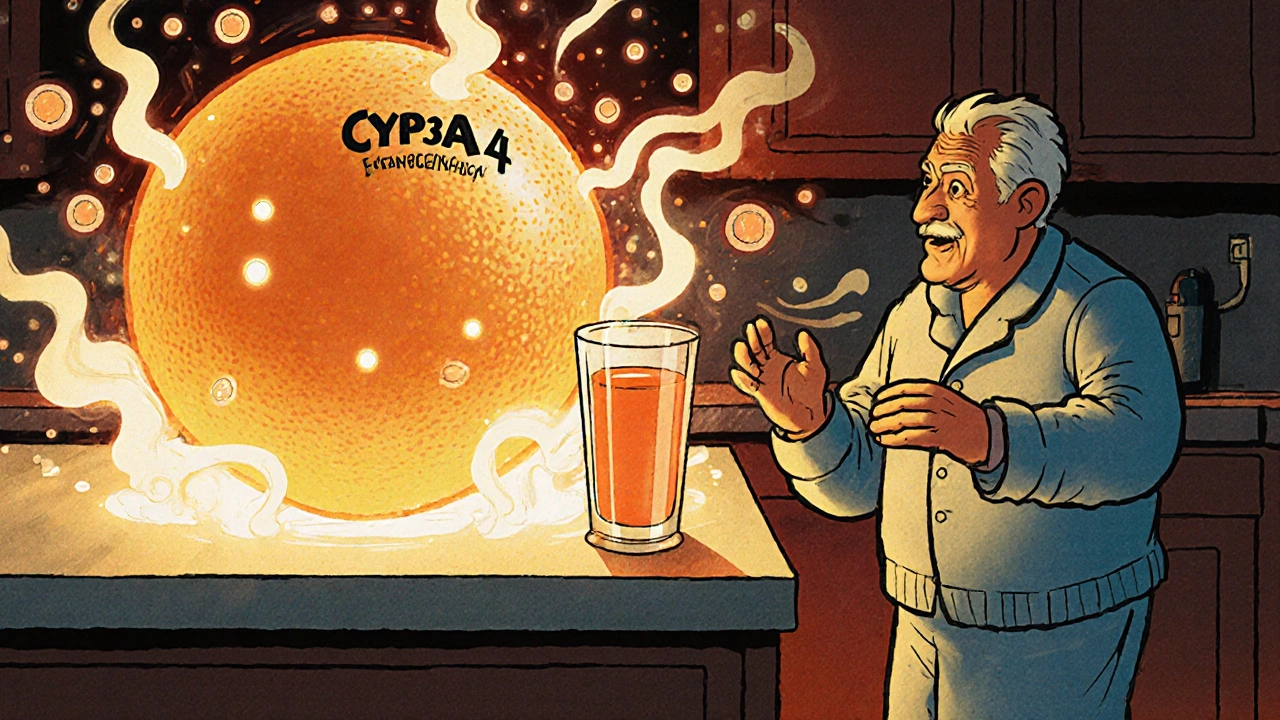If you take a calcium channel blocker for high blood pressure and enjoy a glass of grapefruit juice with breakfast, you could be putting yourself at serious risk. This isn’t just a vague warning-it’s a well-documented, potentially life-threatening interaction that affects millions of people worldwide. The problem isn’t about sugar or calories. It’s about how your body processes the medicine you rely on to stay healthy.
Why Grapefruit Is a Problem
Grapefruit isn’t the only citrus fruit that causes issues, but it’s by far the worst offender. That’s because it contains chemicals called furanocoumarins, specifically 6',7'-dihydroxybergamottin and bergamottin. These compounds don’t just sit in your stomach-they actively shut down an enzyme in your gut called CYP3A4. This enzyme is responsible for breaking down many medications before they enter your bloodstream. When it’s blocked, your body absorbs way more of the drug than it should.One 200ml glass of grapefruit juice-about one small glass-is enough to disable CYP3A4 for up to 72 hours. That means even if you drink your juice in the morning and take your pill at night, the interaction still happens. The enzyme doesn’t bounce back quickly. It needs to be regenerated by your body, and that takes days.
Which Calcium Channel Blockers Are Most Affected?
Not all calcium channel blockers react the same way. The ones most at risk are the dihydropyridine class, which includes:- Felodipine-the most sensitive. Grapefruit juice can increase its levels in your blood by 3 to 5 times. A normal dose can become dangerously high.
- Nicardipine and Nimodipine-both show major increases in blood concentration when taken with grapefruit.
- Amlodipine-while less affected than felodipine, studies still show a measurable rise in blood levels. It’s not safe to assume it’s harmless.
Non-dihydropyridines like verapamil and diltiazem may have some interaction, but it’s usually less severe. Still, doctors recommend avoiding grapefruit with all calcium channel blockers unless proven otherwise.
What Happens When the Interaction Occurs?
When too much calcium channel blocker enters your system, your blood pressure drops too far, too fast. You might feel:- Dizziness or lightheadedness
- Flushing or warm skin
- Swelling in your ankles or feet (peripheral edema)
- Rapid heartbeat (reflex tachycardia)
- Fainting or near-fainting episodes
These symptoms aren’t just uncomfortable-they’re dangerous. Elderly patients are especially vulnerable. One nurse practitioner reported a case where an older woman collapsed after taking her usual amlodipine dose with grapefruit juice. Her intended 60mg dose had effectively become 140mg by the fourth day of daily grapefruit consumption. She couldn’t stand without help.

Other Citrus Fruits to Avoid
It’s not just grapefruit. Seville oranges (the sour kind used in marmalade) and tangelos also contain high levels of furanocoumarins and should be avoided. Even some orange juices made from these varieties can trigger the same reaction.Regular sweet oranges-like navel or Valencia-are generally safe. They have very low levels of these compounds. But be careful with orange marmalade. If it’s made from Seville oranges, it’s risky. Always check the label.
What Can You Take Instead?
If you love citrus and need to manage your blood pressure, you have options. Medications that don’t rely on CYP3A4 for metabolism are much safer:- ACE inhibitors like lisinopril
- ARBs like valsartan or losartan
- Thiazide diuretics like hydrochlorothiazide
- Some beta blockers like metoprolol
These alternatives work just as well for lowering blood pressure without the grapefruit risk. Talk to your doctor about switching if you’re on a high-risk calcium channel blocker and can’t give up citrus.

Why This Interaction Is Still Underestimated
Despite being known since the late 1980s, this interaction remains poorly understood-even by some doctors. A 2022 survey found that only 37% of primary care physicians routinely ask patients if they eat grapefruit when prescribing calcium channel blockers. Meanwhile, 68% of patients had no idea their morning juice could interfere with their medication.Pharmacies often don’t flag this interaction on labels, and many patients assume if their pill doesn’t say "avoid grapefruit," it’s safe. That’s not true. The warning only appears on the most sensitive drugs like felodipine and nimodipine. For others, like amlodipine, the risk is lower-but still real.
What Should You Do?
Here’s what to do right now if you take a calcium channel blocker:- Check your medication name. If it’s felodipine, nicardipine, or nimodipine-stop grapefruit completely.
- If you take amlodipine, avoid grapefruit juice unless your doctor says it’s okay. Even small amounts add up over time.
- Read labels on orange juice and marmalade. Look for "Seville orange" or "sour orange." Avoid them.
- Don’t assume timing helps. Drinking juice in the morning and taking your pill at night doesn’t prevent the interaction.
- Ask your doctor or pharmacist for a list of safe alternatives if you’re worried about giving up citrus.
There’s no safe amount of grapefruit if you’re on a high-risk calcium channel blocker. Even occasional consumption can lead to dangerous buildup over time. The enzyme stays blocked for days. One glass every few days still adds up.
What’s Next?
Researchers are working on new versions of amlodipine that are less affected by grapefruit. Two extended-release formulations are in late-stage clinical trials and show a 70% reduction in interaction risk. But these aren’t available yet. Until then, the safest choice is simple: avoid grapefruit entirely.High blood pressure is manageable. But it’s not worth risking a fall, a hospital visit, or worse just to keep a habit that’s easy to change. Your body doesn’t know the difference between a glass of juice and a pill. It only knows what’s in your bloodstream-and too much calcium channel blocker can be deadly.
Can I have orange juice instead of grapefruit juice while taking calcium channel blockers?
Yes, regular sweet orange juice-like navel or Valencia-is generally safe. It contains very low levels of the compounds that interfere with medication metabolism. However, avoid Seville oranges and sour orange products, including some marmalades, as they contain furanocoumarins like grapefruit. Always check the ingredient label.
How long does the grapefruit interaction last after I stop drinking it?
The enzyme CYP3A4 in your gut takes up to 72 hours to regenerate after being inhibited by grapefruit. That means even if you stop drinking grapefruit juice on Monday, the interaction can still occur if you take your calcium channel blocker on Wednesday. For safety, avoid grapefruit for at least three days before and during your medication use.
Is amlodipine safe with grapefruit?
Amlodipine has a lower risk than felodipine or nimodipine, but studies still show increased blood levels when taken with grapefruit juice. It’s not considered completely safe. If you take amlodipine, it’s best to avoid grapefruit entirely. If you can’t, talk to your doctor about monitoring your blood pressure more closely or switching to a different medication.
What are the signs I’ve had a bad interaction?
Watch for sudden dizziness, fainting, swelling in your ankles, rapid heartbeat, or extreme fatigue. These could mean your blood pressure dropped too low. If you’ve had grapefruit juice and experience any of these symptoms, sit down, call your doctor, and avoid grapefruit until you’ve been evaluated.
Can I eat grapefruit if I take my calcium channel blocker at night?
No. The interaction doesn’t depend on timing. Grapefruit juice disables the enzyme in your gut for up to three days. Taking your pill at night after drinking juice in the morning won’t prevent the interaction. The enzyme remains inactive, and your body absorbs more of the drug than intended.
Are there any new medications that don’t interact with grapefruit?
Yes, two new extended-release versions of amlodipine are in Phase III clinical trials and show a 70% reduction in grapefruit interaction. These aren’t available yet, but they represent the future of safer blood pressure treatment. Until then, avoid grapefruit with all calcium channel blockers unless your doctor confirms it’s safe.
Why don’t pharmacies warn me about this?
Many pharmacies only include warnings on the most high-risk drugs like felodipine. For others, like amlodipine, the risk is lower but still present. Pharmacists aren’t always trained to flag this interaction unless it’s explicitly listed on the label. That’s why it’s up to you to ask-especially if you eat citrus regularly.

Esperanza Decor
November 11, 2025 AT 10:58I never realized how dangerous grapefruit juice could be with my blood pressure meds. I’ve been drinking it every morning for years with my amlodipine. I’m going to the pharmacy tomorrow to ask about alternatives. This post literally saved me from a potential hospital trip.
Thanks for laying it out so clearly-no fluff, just facts. I wish more medical content was this straightforward.
Deepa Lakshminarasimhan
November 11, 2025 AT 20:21They’re hiding this on purpose. Big Pharma doesn’t want you to know you can get the same effect with cheaper, safer meds. Grapefruit is natural, but they profit off your confusion. They don’t warn you because they want you dependent on their expensive drugs.
They’ll sell you a new ‘safe’ version of amlodipine next year… for triple the price. Watch.
Erica Cruz
November 13, 2025 AT 14:07Let’s be real-this post is just fearmongering dressed up as science. A 3-5x increase sounds scary, but unless you’re taking 100mg of felodipine, you’re not dropping dead from one glass of juice.
And let’s not forget: millions of people drink grapefruit juice daily with these meds and don’t keel over. The real issue is that doctors don’t educate patients properly, not that grapefruit is some poison.
Also, ‘avoid all citrus’? That’s not evidence-based, that’s lazy medicine. You’re just replacing one anxiety with another.
Johnson Abraham
November 15, 2025 AT 03:23grapefruit = bad. orange juice = good. why is this so hard? i’ve been on amlodipine for 5 yrs and never had a prob. but now im scared. lol.
also why do they make the juice if its so dangerous? someone’s making money off this. 🤔
Shante Ajadeen
November 16, 2025 AT 11:36Thank you for posting this. I’ve been telling my mom for months to stop drinking her grapefruit juice with her meds, but she didn’t believe me. Now I’m sending her this link. She’s 72 and has been dizzy lately-this could explain it.
You made it easy to understand. No jargon, no panic. Just clear, practical advice. That’s rare.
dace yates
November 16, 2025 AT 18:29Wait-if CYP3A4 is blocked for 72 hours, does that mean if I drink grapefruit juice on Monday, I can’t take my pill until Thursday? Or does it reset after 72 hours even if I drink again?
I’m trying to figure out if I can have it once a week safely.
Danae Miley
November 17, 2025 AT 04:28Correction: The enzyme regeneration timeline is not uniform across individuals. Hepatic CYP3A4 activity varies by genetics, age, and liver health. The 72-hour window is an average, not a guarantee. Elderly patients and those with hepatic impairment may take up to 120 hours to fully recover.
Also, ‘regular sweet oranges’ are not universally safe-some commercial juices are blended with Seville orange concentrate. Always verify the source. This post oversimplifies a complex pharmacokinetic interaction.
Charles Lewis
November 18, 2025 AT 06:21It’s important to recognize that this interaction isn’t merely a matter of dietary caution-it’s a systemic failure in patient education, pharmacy labeling protocols, and prescriber awareness. The fact that 68% of patients are unaware of this risk speaks to a profound gap in our public health infrastructure.
Moreover, the assumption that ‘if it’s not on the label, it’s safe’ reflects a dangerous reliance on passive information delivery. We must shift toward proactive, personalized counseling-especially for older adults on multiple medications.
Pharmacists should be mandated to screen for citrus consumption during medication reconciliation. Primary care providers should integrate this into annual wellness visits. This isn’t just about grapefruit-it’s about how we communicate risk in an age of information overload.
And yes, the new extended-release amlodipine formulations are promising, but until they’re widely available, we must treat this interaction with the seriousness it deserves. Lives are at stake.
Renee Ruth
November 18, 2025 AT 06:45My uncle died last year after a fall. He was on felodipine. He loved his grapefruit juice. The coroner didn’t even mention it. The family never knew. Now I’m terrified. I just Googled ‘grapefruit death’ and found 17 similar stories.
This isn’t a warning. This is a silent epidemic. Why isn’t the FDA forcing warning stickers on every bottle of grapefruit juice? Why aren’t doctors screaming about this? Someone needs to take responsibility.
Samantha Wade
November 18, 2025 AT 19:05Let me be clear: This is not a suggestion. It’s a medical imperative. If you are on felodipine, nimodipine, or nicardipine, grapefruit is not an option. Not even occasionally. Not even one sip. Not even if you ‘don’t feel anything.’
And for those on amlodipine-yes, the risk is lower, but it’s not zero. The cumulative effect over weeks and months can lead to dangerous toxicity. This isn’t theoretical. It’s documented in case reports. You are not invincible.
Switch to oranges. Switch to lemon water. Switch to anything else. Your body doesn’t care how much you love grapefruit. It only cares about what’s in your bloodstream. Choose safety. Your future self will thank you.
Elizabeth Buján
November 20, 2025 AT 07:23I used to drink grapefruit juice every day. I thought it was healthy. Then I got dizzy one morning and thought I was having a stroke. Turned out my blood pressure dropped to 78/45. I didn’t connect it until my pharmacist asked if I drank citrus.
Now I drink pomegranate juice instead. Tastes weird at first, but you get used to it.
It’s funny-nature gave us this fruit to be delicious, and medicine made it dangerous. We’re caught between two truths. Maybe the real lesson isn’t to avoid grapefruit… but to listen more carefully to our bodies.
I’m grateful this post exists. I wish I’d read it years ago.
Andrew Forthmuller
November 21, 2025 AT 05:51so if i take my pill at night and juice in morning… still bad? yeah ok. no more grapefruit. easy fix.